译林版九年级下册英语部分课文翻译
- 格式:docx
- 大小:17.10 KB
- 文档页数:4
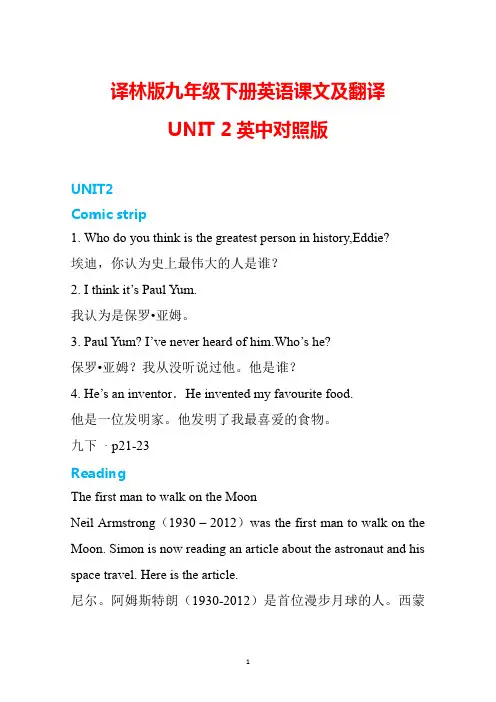
译林版九年级下册英语课文及翻译UNIT 2英中对照版UNIT2Comic strip1. Who do you think is the greatest person in history,Eddie?埃迪,你认为史上最伟大的人是谁?2. I think it’s Paul Yum.我认为是保罗•亚姆。
3. Paul Yum? I’ve never heard of him.Who’s he?保罗•亚姆?我从没听说过他。
他是谁?4. He’s an inventor.He invented my favourite food.他是一位发明家。
他发明了我最喜爱的食物。
九下· p21-23ReadingThe first man to walk on the MoonNeil Armstrong(1930 – 2012)was the first man to walk on the Moon. Simon is now reading an article about the astronaut and his space travel. Here is the article.尼尔。
阿姆斯特朗(1930-2012)是首位漫步月球的人。
西蒙现在正在阅读一篇关于这位宇航员和他的太空旅行的文章。
这是那篇文章。
NEIL ARMSTRONG尼尔•阿姆斯特朗Neil Armstrong was born on 5 August 1930 in Ohio,the USA. He became interestedin flying when he took his first flight at the age of six, He received his student pilot’s licence when he was 16.尼尔•阿姆斯特朗于1930年8月5日出生于美国俄亥俄州。
在他6岁参加第一次飞行时,他就开始对飞行感兴趣。
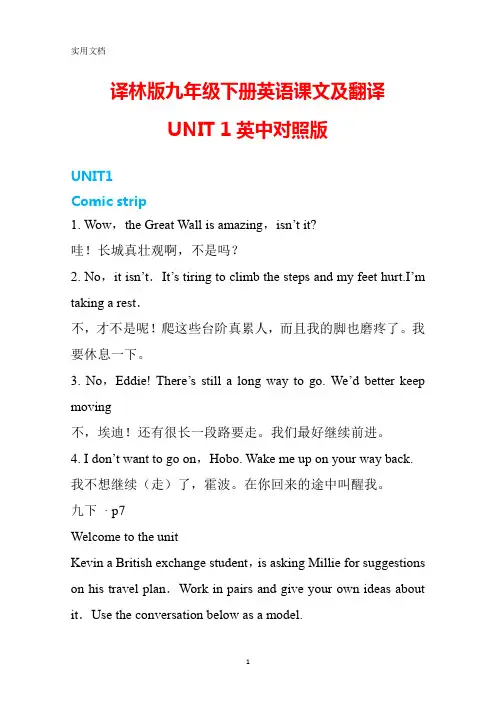
译林版九年级下册英语课文及翻译UNIT 1英中对照版UNIT1Comic strip1. Wow,the Great Wall is amazing,isn’t it?哇!长城真壮观啊,不是吗?2. No,it isn’t.It’s tiring to climb the steps and my feet hurt.I’m taking a rest.不,才不是呢!爬这些台阶真累人,而且我的脚也磨疼了。
我要休息一下。
3. No,Eddie! There’s still a long way to go. We’d better keep moving不,埃迪!还有很长一段路要走。
我们最好继续前进。
4. I don’t want to go on,Hobo. Wake me up on your way back.我不想继续(走)了,霍波。
在你回来的途中叫醒我。
九下· p7Welcome to the unitKevin a British exchange student,is asking Millie for suggestions on his travel plan.Work in pairs and give your own ideas about it.Use the conversation below as a model.凯文一名英国交换生,正在向米莉征求有关他旅行计划的建议。
两人一组活动,就这件事给出你自己的观点。
用下面的对话作为范例。
Kevin:I’m planning to travel around China.Where shall I visit first,Millie? 凯文:我打算环游中国。
米莉,我首先应该参观哪里呢?Millie:Since you’re in Beijing now,why don’t you start from here?Tian’anmen Square,the Palace Museum and the Great Wall are wonderful places to go.米莉:由于你现在就在北京,为什么不从这里开始呢?天安门广场、故宫博物院和长城都是很好的去处。
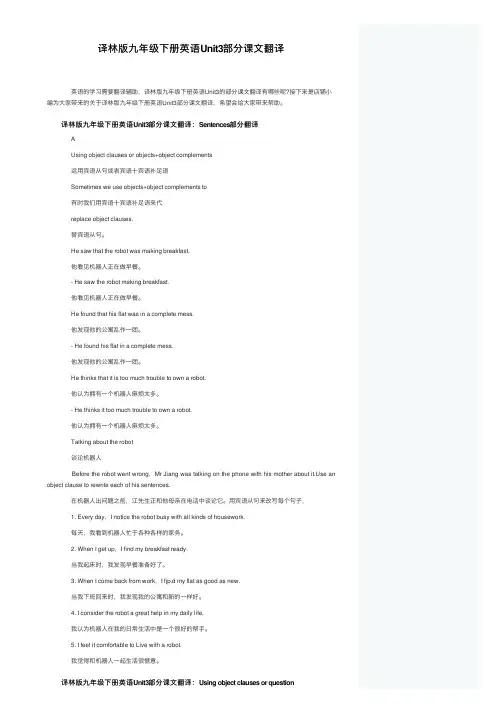
译林版九年级下册英语Unit3部分课⽂翻译 英语的学习需要翻译辅助,译林版九年级下册英语Unit3的部分课⽂翻译有哪些呢?接下来是店铺⼩编为⼤家带来的关于译林版九年级下册英语Unit3部分课⽂翻译,希望会给⼤家带来帮助。
译林版九年级下册英语Unit3部分课⽂翻译:Sentences部分翻译 A Using object clauses or objects+object complements 运⽤宾语从句或者宾语⼗宾语补⾜语 Sometimes we use objects+object complements to 有时我们⽤宾语⼗宾语补⾜语来代 replace object clauses. 替宾语从句。
He saw that the robot was making breakfast. 他看见机器⼈正在做早餐。
- He saw the robot making breakfast. 他看见机器⼈正在做早餐。
He found that his flat was in a complete mess. 他发现他的公寓乱作⼀团。
- He found his flat in a complete mess. 他发现他的公寓乱作⼀团。
He thinks that it is too much trouble to own a robot. 他认为拥有⼀个机器⼈⿇烦太多。
- He thinks it too much trouble to own a robot. 他认为拥有⼀个机器⼈⿇烦太多。
Talking about the robot 谈论机器⼈ Before the robot went wrong,Mr Jiang was talking on the phone with his mother about e an object clause to rewrite each of his sentences. 在机器⼈出问题之前,江先⽣正和他母亲在电话中谈论它。
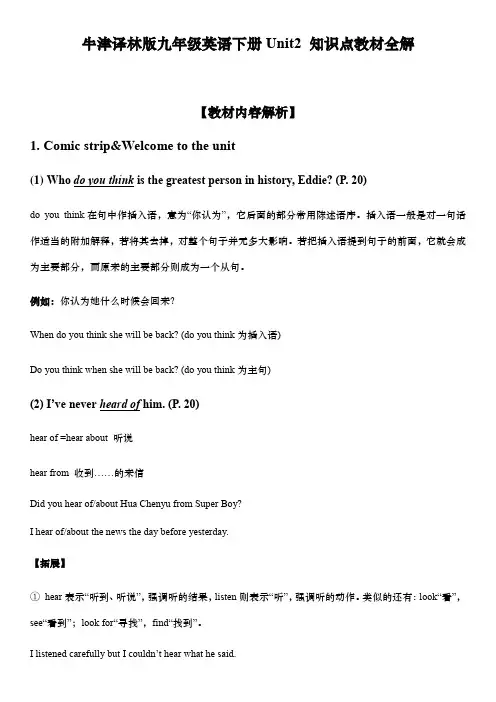
牛津译林版九年级英语下册Unit2 知识点教材全解【教材内容解析】ic strip&Welcome to the unit(1)Who do you think is the greatest person in history, Eddie? (P. 20)do you think在句中作插入语,意为“你认为”,它后面的部分常用陈述语序。
插入语一般是对一句话作适当的附加解释,若将其去掉,对整个句子并无多大影响。
若把插入语提到句子的前面,它就会成为主要部分,而原来的主要部分则成为一个从句。
例如:你认为她什么时候会回来?When do you think she will be back? (do you think为插入语)Do you think when she will be back? (do you think为主句)(2) I’ve never heard of him. (P. 20)hear of =hear about 听说hear from 收到……的来信Did you hear of/about Hua Chenyu from Super Boy?I hear of/about the news the day before yesterday.【拓展】①hear表示“听到、听说”,强调听的结果,listen则表示“听”,强调听的动作。
类似的还有:look“看”,see“看到”;look for“寻找”,find“找到”。
I listened carefully but I couldn’t hear what he said.②hear sb. doing sth.“听到某人正在做某事”Can you hear the girl singing in the next room?③hear sb. do sth.“听到某人做某事的全过程”Parents heard the teacher scold their son for half an hour.(3)He’s an inventor. He invented my favourite food. (P. 20)invent作动词,意为“发明、创造”,其名词形式为inventor“发明者”和invention“发明物”。
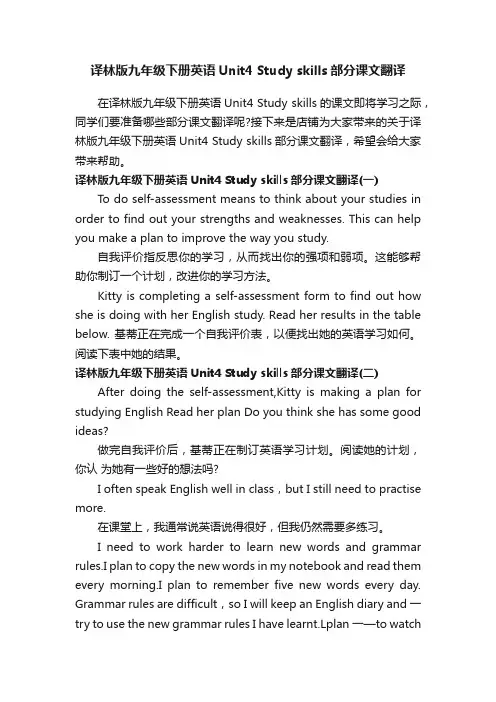
译林版九年级下册英语Unit4 Study skills部分课文翻译在译林版九年级下册英语Unit4 Study skills的课文即将学习之际,同学们要准备哪些部分课文翻译呢?接下来是店铺为大家带来的关于译林版九年级下册英语Unit4 Study skills部分课文翻译,希望会给大家带来帮助。
译林版九年级下册英语Unit4 Study skills部分课文翻译(一) To do self-assessment means to think about your studies in order to find out your strengths and weaknesses. This can help you make a plan to improve the way you study.自我评价指反思你的学习,从而找出你的强项和弱项。
这能够帮助你制订一个计划,改进你的学习方法。
Kitty is completing a self-assessment form to find out how she is doing with her English study. Read her results in the table below. 基蒂正在完成一个自我评价表,以便找出她的英语学习如何。
阅读下表中她的结果。
译林版九年级下册英语Unit4 Study skills部分课文翻译(二) After doing the self-assessment,Kitty is making a plan for studying English Read her plan Do you think she has some good ideas?做完自我评价后,基蒂正在制订英语学习计划。
阅读她的计划,你认为她有一些好的想法吗?I often speak English well in class,but I still need to practise more.在课堂上,我通常说英语说得很好,但我仍然需要多练习。
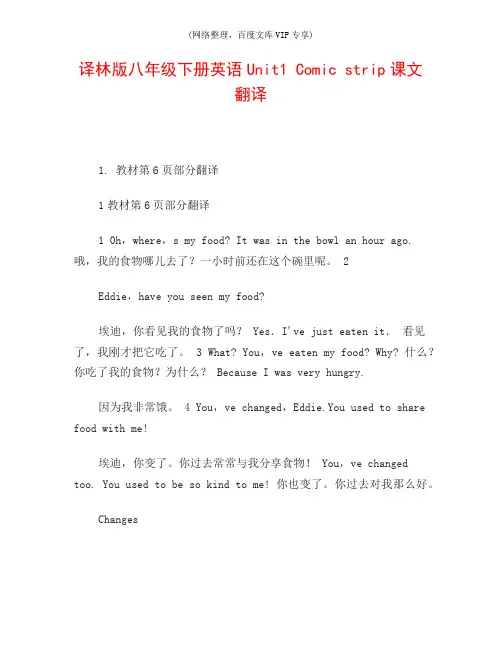
译林版八年级下册英语Unit1 Comic strip课文翻译1. 教材第6页部分翻译1教材第6页部分翻译1 0h,where,s my food? It was in the bowl an hour ago. 哦,我的食物哪儿去了?一小时前还在这个碗里呢。
2Eddie,have you seen my food?埃迪,你看见我的食物了吗? Yes.I've just eaten it.看见了,我刚才把它吃了。
3 What? You,ve eaten my food? Why? 什么?你吃了我的食物?为什么? Because I was very hungry.因为我非常饿。
4 You,ve changed,Eddie.You used to share food with me!埃迪,你变了。
你过去常常与我分享食物! You,ve changed too. You used to be so kind to me! 你也变了。
你过去对我那么好。
Changes变化 The Class 1,Grade 8 students are going to do a history project on the changes in Beijing over the years. 八年级一班的学生打算做一个关于北京近几年来变化的历史课题。
Task任务 Write a report on the changesin your hometown . 写一篇关于你家乡变化的报告。
译林版八年级下册英语Unit1 Welcome to theunit课文翻译1. A 部分翻译2. B 部分翻译1A 部分翻译Transport at different times不同时代的交通工具 Daniel wants to know about the different forms of transport in Beijing. Help him write the correct names under the pictures.丹尼尔想了解北京不同形式的交通工具。
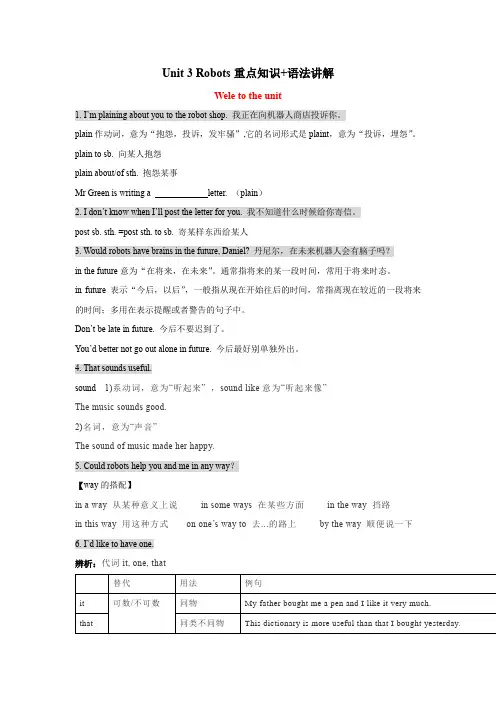
Unit 3 Robots重点知识+语法讲解Wele to the unit1. I’m plaining about you to the robot shop. 我正在向机器人商店投诉你。
plain作动词,意为“抱怨,投诉,发牢骚”,它的名词形式是plaint,意为“投诉,埋怨”。
plain to sb. 向某人抱怨plain about/of sth. 抱怨某事Mr Green is writing a letter. (plain)2. I don’t know when I’ll post the letter for you. 我不知道什么时候给你寄信。
post sb. sth. =post sth. to sb. 寄某样东西给某人3. Would robots have brains in the future, Daniel? 丹尼尔,在未来机器人会有脑子吗?in the future意为“在将来,在未来”。
通常指将来的某一段时间,常用于将来时态。
in future 表示“今后,以后”,一般指从现在开始往后的时间,常指离现在较近的一段将来的时间;多用在表示提醒或者警告的句子中。
Don’t be late in future. 今后不要迟到了。
You’d better not go out alone in future. 今后最好别单独外出。
4. That sounds useful.sound 1)系动词,意为“听起来” ,sound like意为“听起来像”The music sounds good.2)名词,意为“声音”The sound of music made her happy.5. Could robots help you and me in any way?【way的搭配】in a way 从某种意义上说in some ways 在某些方面in the way 挡路in this way 用这种方式on one’s way to 去...的路上by the way 顺便说一下6. I’d like to have one.Reading1. He is always too busy to have any time to relax. 他总是忙得没有时间放松。
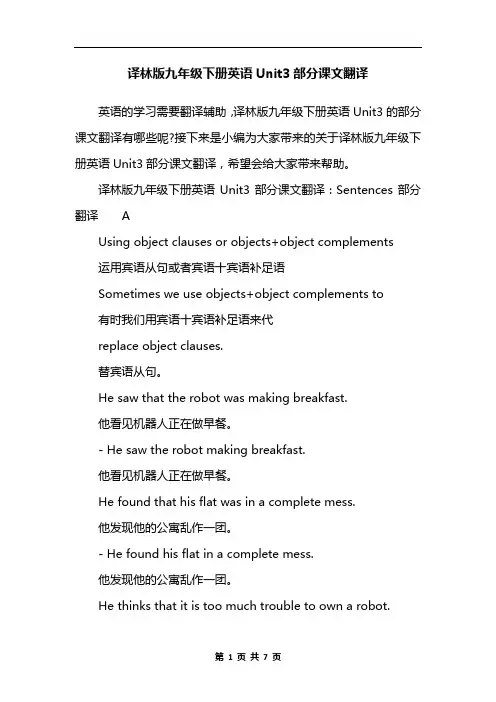
译林版九年级下册英语Unit3部分课文翻译英语的学习需要翻译辅助,译林版九年级下册英语Unit3的部分课文翻译有哪些呢?接下来是小编为大家带来的关于译林版九年级下册英语Unit3部分课文翻译,希望会给大家带来帮助。
译林版九年级下册英语Unit3部分课文翻译:Sentences部分翻译 AUsing object clauses or objects+object complements运用宾语从句或者宾语十宾语补足语Sometimes we use objects+object complements to有时我们用宾语十宾语补足语来代replace object clauses.替宾语从句。
He saw that the robot was making breakfast.他看见机器人正在做早餐。
- He saw the robot making breakfast.他看见机器人正在做早餐。
He found that his flat was in a complete mess.他发现他的公寓乱作一团。
- He found his flat in a complete mess.他发现他的公寓乱作一团。
He thinks that it is too much trouble to own a robot.他认为拥有一个机器人麻烦太多。
- He thinks it too much trouble to own a robot.他认为拥有一个机器人麻烦太多。
Talking about the robot谈论机器人Before the robot went wrong,Mr Jiang was talking on the phone with his mother about e an object clause to rewrite each of his sentences.在机器人出问题之前,江先生正和他母亲在电话中谈论它。
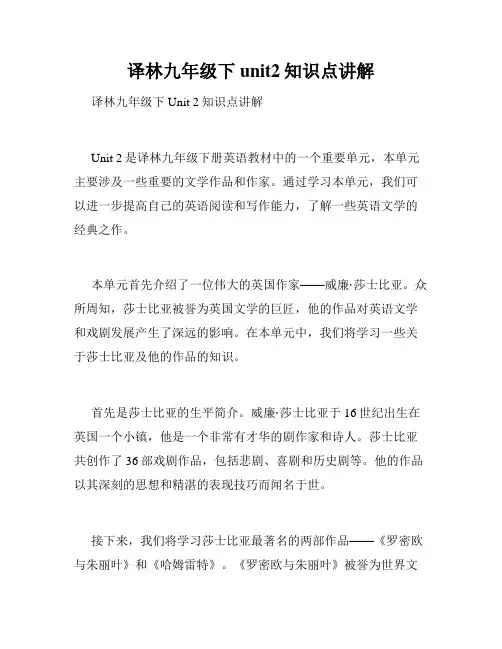
译林九年级下unit2知识点讲解译林九年级下Unit 2知识点讲解Unit 2是译林九年级下册英语教材中的一个重要单元,本单元主要涉及一些重要的文学作品和作家。
通过学习本单元,我们可以进一步提高自己的英语阅读和写作能力,了解一些英语文学的经典之作。
本单元首先介绍了一位伟大的英国作家——威廉·莎士比亚。
众所周知,莎士比亚被誉为英国文学的巨匠,他的作品对英语文学和戏剧发展产生了深远的影响。
在本单元中,我们将学习一些关于莎士比亚及他的作品的知识。
首先是莎士比亚的生平简介。
威廉·莎士比亚于16世纪出生在英国一个小镇,他是一个非常有才华的剧作家和诗人。
莎士比亚共创作了36部戏剧作品,包括悲剧、喜剧和历史剧等。
他的作品以其深刻的思想和精湛的表现技巧而闻名于世。
接下来,我们将学习莎士比亚最著名的两部作品——《罗密欧与朱丽叶》和《哈姆雷特》。
《罗密欧与朱丽叶》被誉为世界文学史上最伟大的爱情悲剧之一,它讲述了两位年轻人的悲剧爱情故事。
这部作品以其深情的描写、动人的对白和扣人心弦的情节而受到广大读者的喜爱。
而《哈姆雷特》则是莎士比亚最具代表性的戏剧之一。
它被认为是人类文学史上最伟大的作品之一,不仅揭示了人性的复杂性,还探讨了道德、权力和正义等重要的哲学问题。
莎士比亚以其独特的写作手法和深度的思考,展示了他卓越的才能和智慧。
除了莎士比亚,本单元还介绍了其他一些重要的作家和作品,比如英国作家查尔斯·狄更斯和他的作品《雾都孤儿》。
这部作品以其生动的人物形象和写实的描写方式而为读者所喜爱。
通过本单元的学习,我们不仅可以了解这些重要的英语文学作品,还可以提高自己的阅读和写作能力。
在课堂上,我们可以通过阅读这些作品的摘要、对话和课文,了解作者的写作意图和思想内涵,同时也可以学习一些高级的英语词汇和表达方式。
在学习过程中,老师可以通过提问、小组讨论和角色扮演等方式激发学生的学习兴趣和参与度。
此外,我们还可以进行一些相关的写作练习,比如写一篇关于自己最喜欢的作家或作品的文章,运用所学到的知识和技巧进行描述和评价。
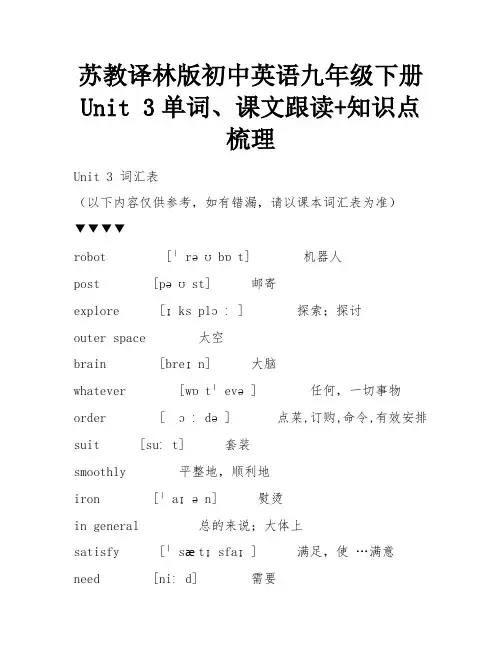
苏教译林版初中英语九年级下册Unit 3单词、课文跟读+知识点梳理Unit 3 词汇表(以下内容仅供参考,如有错漏,请以课本词汇表为准)▼▼▼▼robot [ˈrəʊbɒt] 机器人post [pəʊst] 邮寄explore [ɪks plɔː] 探索;探讨outer space 太空brain [breɪn] 大脑whatever [wɒtˈevə] 任何,一切事物order [ ɔːdə] 点菜,订购,命令,有效安排suit [suːt] 套装smoothly 平整地,顺利地iron [ˈaɪən] 熨烫in general 总的来说;大体上satisfy [ˈsætɪsfaɪ] 满足,使…满意need [niːd] 需要virus [ˈvaɪərəs] 病毒no longer 不再properly [ˈprɒpəli] 正确地,适当地plete [kəmˈpliːt] 完全的,彻底的mess [mes] 乱七八糟,混乱,困境lay [leɪ] 放,搁store [stɔː] 储藏,存储coin [kɔɪn] 硬币bill [bɪl] 账单;钞票private [ˈpraɪvɪt] 私人的paper [ peɪpə] 文件,证明spread [spred] 使散开;扩散wheel [hwiːl] 轮子,车轮pill [pɪl] 药片;药丸unsure 不确定,没把握forgetful [fəˈɡetfʊl] 健忘的stair [steə] 楼梯battery [ˈbætəri] 电池customer [ˈkʌstəmə] 消费者,顾客hold [həʊld] (打电话时)等待,不挂断through [θruː] (电话)接通者put through 给…接通(电话)satisfied 满意的,满足的be satisfied with 对…感到满意first of all 首先quality [ˈkwɒlɪti] 质量up to standard 达到标准pletely 完全地regret [rɪˈɡret]后悔;遗憾product [ˈprɒdʌkt] 成品,成果。
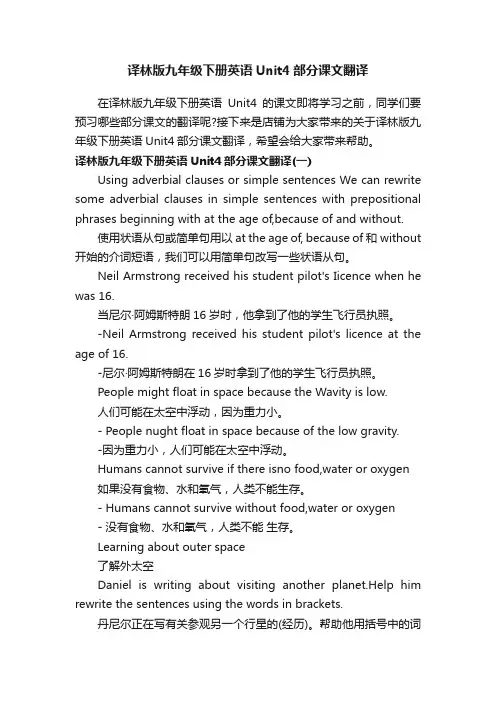
译林版九年级下册英语Unit4部分课文翻译在译林版九年级下册英语Unit4的课文即将学习之前,同学们要预习哪些部分课文的翻译呢?接下来是店铺为大家带来的关于译林版九年级下册英语Unit4部分课文翻译,希望会给大家带来帮助。
译林版九年级下册英语Unit4部分课文翻译(一)Using adverbial clauses or simple sentences We can rewrite some adverbial clauses in simple sentences with prepositional phrases beginning with at the age of,because of and without.使用状语从句或简单句用以at the age of, because of和without 开始的介词短语,我们可以用简单句改写一些状语从句。
Neil Armstrong received his student pilot's Iicence when he was 16.当尼尔·阿姆斯特朗16岁时,他拿到了他的学生飞行员执照。
-Neil Armstrong received his student pilot's licence at the age of 16.-尼尔·阿姆斯特朗在16岁时拿到了他的学生飞行员执照。
People might float in space because the Wavity is low.人们可能在太空中浮动,因为重力小。
- People nught float in space because of the low gravity.-因为重力小,人们可能在太空中浮动。
Humans cannot survive if there isno food,water or oxygen 如果没有食物、水和氧气,人类不能生存。
译林版九年级下册英语Unit1Task部分课文翻译英语课文的翻译辅助同学们学习英语,关于译林版九年级下册英语Unit1 Task的部分课文翻译有哪些呢?接下来是店铺为大家带来的关于译林版九年级下册英语Unit1 Task部分课文翻译,希望会给大家带来帮助。
译林版九年级下册英语Unit1 Task部分课文翻译A:Miss Thompson asked the Class l,Grade 9students to suggest a country in Asia for them to visit. Millie would like to suggest India, and she has prepared some notes of it.Read her notes.汤普生小姐要求九年级一班的学生向他们建议一个亚洲国家去游览。
米莉想建议印度,她已经准备了关于印度的一些笔记。
阅读她的笔记。
Country:lndia国家:印度Location: in South Asia, next to Pakistan ,China,and Nepal.位置:在南亚,紧靠着巴基斯坦、中国和尼泊尔。
Capital city: New Delhi首都城市:新德里Languages:maidy Hindi,English as a second language语言:主要是印地语,英语作为第二语言Population: over one billion,the second largest population m the world.人口:超过十亿,世界上第二大人口Crops: rice and wheat作物:大米和小麦Main industries:large iron and steel industry主要产业:大型钢铁工业famous for it industry以信息技术产业闻名Customs:many festivals and fairs-traditional clothes for women风俗:许多节日和集市莎丽——妇女的传统服装Attraction:Taj Mahal引人入胜的地方:泰姬陵译林版九年级下册英语Unit1 Task部分课文翻译B:Millie is writing an introduction to India Help her complete her article with the information in Part A.米莉正在写一篇对印度的介绍。
译林版牛津初中英语九下readi ng译文=======================================Unit 1Welcom e to Beijin g!欢迎来北京!I am Wei Ke from Beijin g, the capita l of China.我是来自中国首都北京的魏可。
In the middle of the ancien t city of Beijin g is the Palace Museum, also called the Forbid den City.在北京古城的中间就是故宫,也叫做紫禁城。
The empero rs of the Ming and Qing dynast ies used to live there.明朝和清朝的皇帝过去就住在那里。
It was turned into a museum in 1925.它在1925年变为博物馆。
With wonder ful buildi ngs and art treasu res inside, it is well wortha visit.它里面有宏伟的建筑和艺术珍宝,非常值得一游。
Next to the Palace Museum is Tian'anmenSquare, the bigges t city square in the world.故宫旁边就是世界上最大的城市广场--天安门广场。
Many touris ts like to gather thereearlyin the mornin g to watchthe raisin g of the nation al flag.许多游客喜欢一大早聚集在那里观看升旗仪式。
In the north-west of Beijin g is the Summer Palace,颐和园在北京的西北部,a largeChines e garden set in a natura l landsc ape.它是一个坐落在自然景观中的大型中国式园林。
译林版九年级下册英语Unit4课文翻译英语翻译可以给同学们的学习带来便利,关于译林版九年级下册英语Unit4的课文翻译有哪些呢?接下来是店铺为大家带来的关于译林版九年级下册英语Unit4课文翻译,希望会给大家带来帮助。
译林版九年级下册英语Unit4课文翻译(一)AlDaniel wants to live on Mars in the future.However,Sandy is still not sure if she would like to. This week,there is a TV programme on this topic, Listen to the preview. Help Sandy make notes of it.丹尼尔想将来住在火星上。
然而,桑迪仍然不确定她是否想去。
本周,有一个有关这个话题的电视节目。
听听预告片,帮助桑迪做笔记。
Survey carried out in:(l)Schools in Sunshine Town调查开展地点:(1)阳光城镇学校Day:(2)____日期:(2)____Channel:(3)____频道:(3)____Name of programme: (4) ____电视节目名称:(4)____Time: (5) ____时间:(5)____prrcCnLagC.,;pasemId3: of students who would like to move away from the Earth: (6) ____想搬离地球的学生的百分数(6) ____A2Sandy is watching the TV programme. She wants to write down the important points. Listen to the discussion and help hercomplete her lists.桑迪正在看电视节目。
译林版九年级下册英语课文及翻译UNIT 4英中对照版UNIT4Comic strip1. -Wow,I've never thought about travelling into space.哇,我从未想过到太空旅行。
-Me neither.我也没有。
2. -How do you like life on Mars?你认为火星上的生活怎么样?-I hate it.我讨厌它。
3. -Why do you hate it? I thought you liked Mars.你为什么讨厌它?我原以为你喜欢火星。
-It's this helmet.是(因为)这个头盔。
4. I can't get to my food.我够不着我的食物九下· p51Welcome to the unitDaniel is talking to Amy about living on Mars. What would it be like? Work in pairs and discuss with your partner. Use the conversation below as a model.丹尼尔正在和埃米谈论火星上的生活。
它会是什么样子呢?结对练习,与同伴讨论。
用下面的对话作为示范。
Daniel:What would it be like to live on Mars?丹尼尔:住在火星上将会是什么样子呢?Amy:There's less gravity on Mars. We'd probably need to wear special boots.埃米:火星上重力小。
我们可能需要穿特殊的靴子。
Daniel:Yes. And we might need sleeping bags too.丹尼尔:是的。
我们可能也需要睡袋。
Amy:l agree. Also,there's no fruit or vegetables,so we would have to eat dried food.埃米:我赞同。
译林版九年级下册英语部分课文翻译译林版九年级下册英语部分课文翻译(一)booklet about life in the future关于未来生活的小册子What kind of world would you like to live in?Make a booklet about your life in the future.你想住在什么样的世界里?制作一个关于你的未来生活的小册子。
A Planning and preparingA 计划和准备1. Work in pairs. Talk about where you would like to live. You could live:两人一组练习。
谈谈你想住在哪里。
你可以活着:·on the Earth 在地球上·on Mars 在火星上·on the Moon 在月球上·1n space 在太空中·somewhere else 其他的一些地方2. Write a heading called“Things I would need”.Under the heading.list the most important things you would like to have in your future world.写一个命名为“我将需要的东西”的标题。
在标题下,列出在未来世界中你想拥有的最重要的东西。
3. You have a robot in your future world. What kind of robot do you want? You can choose one of these:雀未来世界中你拥有一个机器人。
你想要什么样的机器人?你可以选择其中的一种:·a home robot 家庭机器人·a schoolwork robot 学校作业机器人·a hobby robot 爱好机器人·a sports robot 运动机器人·a teacher robot 教师机器人What would your robot be able to do? What characteristics should your robot have? Write,down your answers.你的机器人能够做什么?你的机器人有什么特征?写下你的答案。
译林版九年级下册英语Unit4 Task部分课文翻译英语课文的学习需要翻译的对照,关于译林版九年级下册英语Unit4 Task的部分课文翻译有哪些呢?接下来是店铺为大家带来的关于译林版九年级下册英语Unit4 Task部分课文翻译,希望会给大家带来帮助。
译林版九年级下册英语Unit4 Task部分课文翻译(一)Daniel is making a guide to living on Mars in the future. First,help him complete the spidergram below to organize his ideas. Write the correct letters in the blanks.丹尼尔正在制订一个将来在火星上的生活指南。
首先,帮助他完成下面这个蛛网图来组织观点。
在空白处写下正确的字母。
a . Cars float in the air 汽车飘浮在空中b . Low-gravity basketball games 低重力的篮球比赛c. Traffic with no air pollution 没有空气污染的交通d . Space clothes and food 太空服和食物e. Many online theatres 许多网上剧院f . Planet Mars Bank 火星银行g . Goods from the Earth are hard to find 来自地球的商品很难找到h . Visit the two moons 参观两颗卫星译林版九年级下册英语Unit4 Task部分课文翻译(二)Danielis writing his draft. Help him complete e the information on page 62 to help you.Here is a guide to living on Mars in the future.On Mars, we use Mars dollars. We get about M$ 10 for every¥1,but we never see any of it! Mars dollars are electronic and are stored in the (1)_____.丹尼尔正在写草稿。
译林版九年级下册英语部分课文翻译
英语的课文翻译可以帮助同学们熟悉英语课文,提升学习成绩,关于译林版九年级下册英语部分的课文翻译有哪些呢?接下来是店铺为大家带来的关于译林版九年级下册英语部分课文的翻译,希望会给大家带来帮助。
译林版九年级下册英语部分课文翻译(一)
booklet about life in the future
关于未来生活的小册子
What kind of world would you like to live in?Make a booklet about your life in the future.
你想住在什么样的世界里?制作一个关于你的未来生活的小册子。
A Planning and preparing
A 计划和准备
1. Work in pairs. Talk about where you would like to live. You could live:
结对练习。
谈论你想住在哪儿。
你可能居住:
·on the Ea rth 在地球上
·on Mars 在火星上
·on the Moon 在月球上
·1n space 在太空中
·somewhere else 其他的一些地方
2. Write a heading called“Things I would need”.Under the heading.list the most important things you would like to have in your future world.
写一个命名为“我将需要的东西”的标题。
在标题下,列出在未来世界中你想拥有的最重要的东西。
3. You have a robot in your future world. What kind of robot do you want? You can choose one of these:
雀未来世界中你拥有一个机器人。
你想要什么样的机器人?你可以
选择其中的一种:
·a home robot 家庭机器人
·a schoolwork robot 学校作业机器人
·a hobby robot 爱好机器人
·a sports robot 运动机器人
·a teacher robot 教师机器人
What would your robot be able to do? What characteristics should your robot have? Write,down your answers.
你的机器人能够做什么?你的机器人有什么特征?写下你的答案。
4. Think of at least three advantages and three disadvantages of living in your future world. Then fill in the table below.
想出至少三个你生活在未来世界的优点和缺点。
然后填写下面的表格。
译林版九年级下册英语部分课文翻译(二)
Tips for making your booklet
制作小册子提示
Writing
写作
·Use a different page for each topic. Write the headings clearly at the top of each page.
每个主题使用不同的页面。
在每个页面的顶部清晰地写上标题。
Page 1:Life in/on____
第一页:在____的生活
Page 2:Things l would need
第二页:我将需要的东西
Page 3:My robot
第三页:我的机器人
Page 4:Advantages and disadvantages
第四页:优点和缺点
Page 5:Map of____
第五页:____的地图
·Prepare an outline first. Then write the details.
首先准备一个大纲。
然后写细节。
Using pictures and photos
使用图片和照片
·Try to find some pictures that relate to your writing in newspapers or magazines or on the Internet. Add them to your booklet.
尽量在报纸上、杂志上或因特网上找一些与你的写作相关的图片。
把宅们添加到你的小册子里。
·Draw a map of the area where you would Like to live and put it on page 5 0f your booklet.
画一张你想居住地方的地图,并放在小册子的第五页。
·Design an attractive cover showing some of the topics you have written about in your booklet.
设计一张有吸引力的、显示小册子中所写主题的封面。
Putting your booklet together
汇集小册子
·Before you write in your booklet,write a draft.
在写小册子之前,写一个草稿。
·Then check the draft carefully for grammar and spelling mistakes.
然后仔细检查草稿中的语法和拼写错误。
·Next,decide how you want to arrange the pictures for each section.
接下来,决定怎样安排每个部分的图片。
·Finally,copy the revised draft into your booklet.
最后,挹修订草案抄写到你的小册子中。
Presentation
展示
·Use all kinds of materials to make your booklet colourful and interesting.
用各种各样的材料让你的小册子多彩和有趣。
·Use bright colours for your drawings and writing. You can also use a computer to help you set the text and the pictures.
用明亮的颜色绘画和写作。
你也可以用电脑帮助你设置文本和图片。